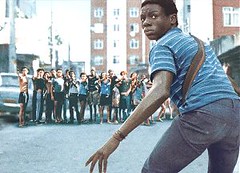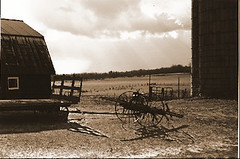City of God (2002)
Dir. Fernando Mereilles, Kátia Lund
Writ. Paulo Lins (novel); Bráulio Mantovani (screenplay)
w/ Alexandre Rodrigues, Leandro Firmino
In this aptly named cinematic phenomenon, the camera explores the fast and bloody rise of L'il Dice to power as he reinvents himself as the drug warlord L'il Zé. Armed with whatever guns he can get his hands on, a severe lack of conscience, and his faithful sidekick Benny, we watch the clever L'il Dice trick his fellow hoods into thinking he's the police and going on a senseless and bloodthirsty rampage inside a hotel that his cohorts have already plundered. The director doesn't shirk from showing the seeming relentless, random, and violent acts that mark each day in the titular ghetto, making each act seem more futile than the last. L'il Dice kills every hood who gets in his way, even Rocket's older brother, Shaggy, who was part of his original posse. The only hood immune to his apathy is Benny. The moment Rocket realizes that the hour in which he could have sought his revenge has passed, it's understood that L'il Zé has become too big.
That's the way stuff goes in the city of God, though, and to help those of us unfamiliar with this maudlin world, Rocket shares his sense of the way things are through his stand-offish sense of things as his interest in photography unfolds. Though the slums are poor and dismal, the beach and the girls he has met in school present a much lovelier view than any he ever cares to acknowledge in the city where it appears he would have to be either a worker or a killer. By the time Little Zé decides he needs a photographer to promote his image, photography is second nature to Rocket. School is just an option to keep him a few steps ahead of the hoods, the slum.
Based on the true story of two hoods, one who got away with everything, and one who took the hits for the public eye (but his is really a different story) City of God exists as a sort of lamppost between the world of the middle class and the survivors. Brought into the encompassing sphere of believability and tempered with the milk of human kindness, the film goes where no other film has gone before, and that isn't just some slum outside of Rio de Janeiro. It syncopates the life of an ordinary boy who could live anywhere with that of a brutal maniac in a land where poverty, hunger, and deprivation rule the humor, personalities, and activities of its citizens. It is a rare glimpse at a world that most Westerners know nothing about and can't relate to one iota.















0 Comments:
Post a Comment
<< Home